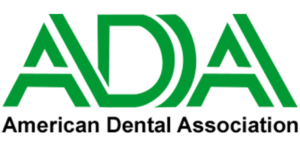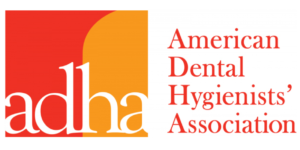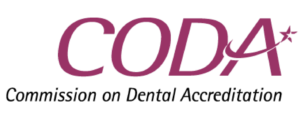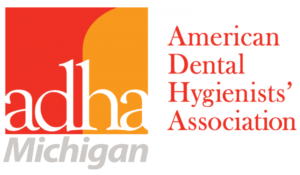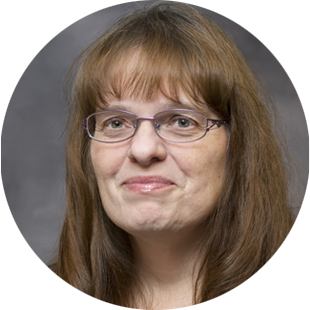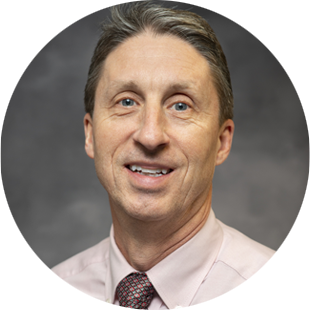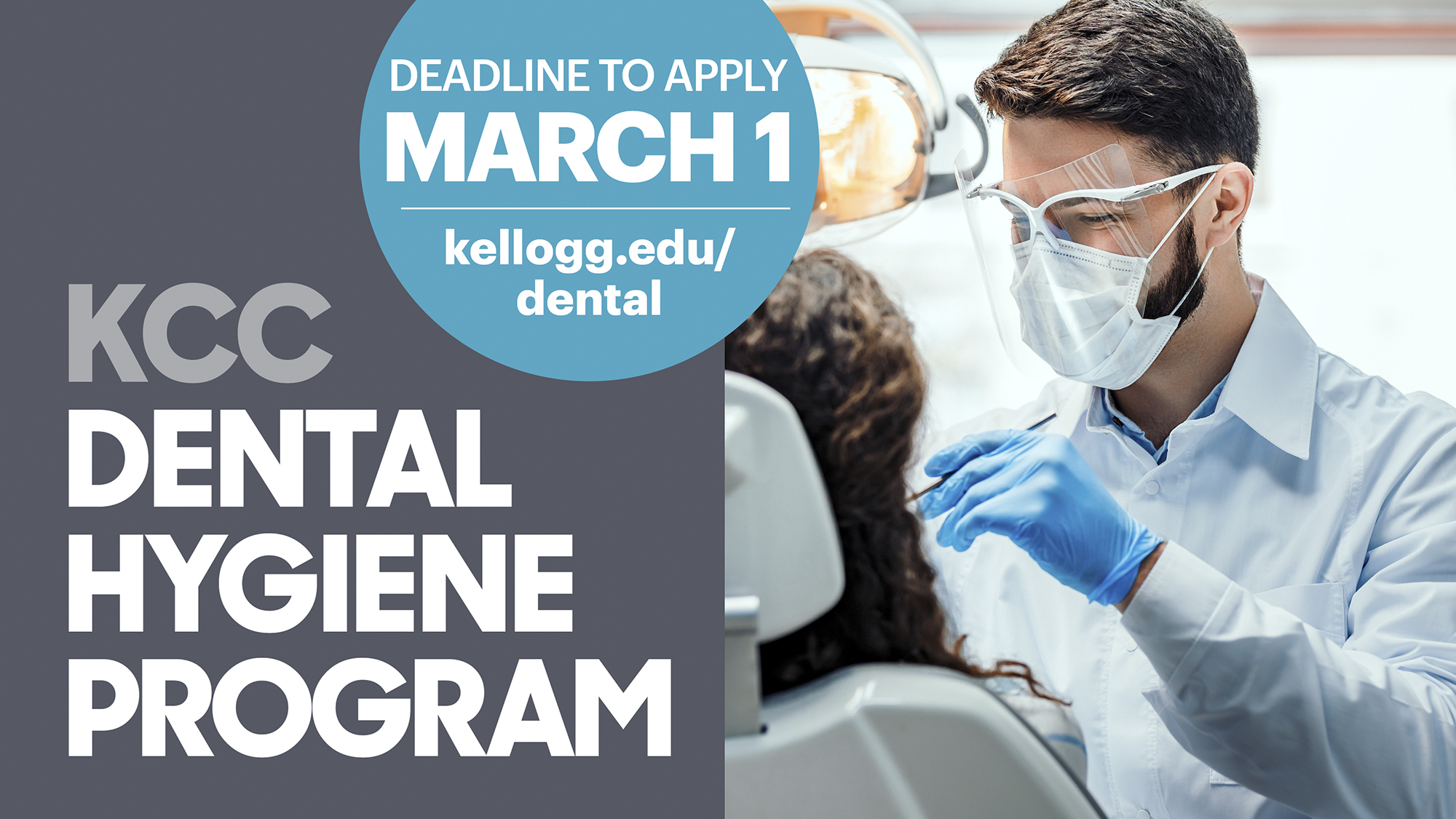
DENTAL HYGIENE
The deadline to apply for KCC’s Dental Hygiene Program beginning the Fall 2024 semester is Friday, March 1! See details, application materials and more at kellogg.edu/dental-hygiene-admissions.
Dental hygiene can be an exciting and rewarding career in which students can make a difference helping others. Dental hygienists provide educational, preventive and therapeutic services in a variety of health care settings.
In most states, dental hygienists work independently under the supervision of a dentist, and in some states dental hygienists may have their own private practice. Additionally, in the state of Michigan, a special designation related to licensure allows the dental hygienist to work more autonomously and serve those with dental needs that do not have access to care in a traditional dental setting.
KCC offers an Associate in Applied Science degree in Dental Hygiene. For more information about KCC’s Dental Hygiene Program, visit:
- Dental Hygiene Admissions
- Associate of Applied Science in Dental Hygiene
- Dental Hygiene (DEHY) course descriptions
- Dental Hygiene Program FAQs
- Dental Hygiene Program Policy Manual
- Summary of Dental Hygiene Clinical Functions
- Michigan Dentistry Licensing Guide
- Dental Hygiene Program Infectious Disease Policy
Advising & Transfer
View transfer guides outlining opportunities for students looking to transfer their KCC credits to a four-year institution. Contact Academic Advising at 269-965-4124 or advising@kellogg.edu to schedule an appointment to plot a personal transfer plan.
Additional Information
Your content goes here. Edit or remove this text inline or in the module Content settings. You can also style every aspect of this content in the module Design settings and even apply custom CSS to this text in the module Advanced settings.
Dental Hygiene Careers
Students who earn a dental hygiene degree and subsequent licensure may work in many settings depending on their interests, including private dental practices, school systems, public health delivery facilities, hospitals, long-term care facilities, HMOs, research centers, dental supply companies, veterinarian dentistry facilities, military bases, government agencies and higher education facilities. Dental hygienists are also in demand in other countries.
Possible job titles for graduates with an education in dental hygiene include:
- Dental hygiene clinical instructor
- Dental hygiene corporate administrator
- Dental hygiene corporate educator
- Dental hygienist
- Dental hygiene product researcher
- Dental hygiene sales representative
For more information about dental hygienist career paths from the American Dental Hygienists’ Association, visit adha.org/professional-roles.
Projected Job Outlook & Salary Info
For the latest employment and wage estimates for dental hygiene careers in Michigan, visit the U.S. Department of Labor’s Bureau of Labor Statistics website at bls.gov/oes/current/oes_mi.htm.
Why Study Dental Hygiene at KCC?
KCC’s Dental Hygiene Program offers unique experiences in the classroom and the clinical environment. Dental Hygiene students learn and gain valuable hands-on experience in KCC’s on-campus Dental Hygiene Clinic, which serves a large patient population that values the integral role the clinic plays in access to care within the community. Within the clinic, students are able to develop skills and see cases that prepare them well to maximize their career opportunities. With just 20 students in a class, access to instructors is maximized for guidance and mentoring.
Also realized within the educational Dental Hygiene Program experience at KCC is a commitment to service-learning. Dental students visit adult and child day care facilities and nursing homes, which provides them with additional experience working with unique populations. The Dental Hygiene Program at KCC has committed, experienced faculty with a passion for educating the next generation of dental hygiene professionals.
Student Learning Partners
During the course of the KCC Dental Hygiene curriculum each student will be required to serve as a student learning partner for many procedures. The primary purpose of delivering these diagnostic, therapeutic and non-therapeutic services to a student by a fellow student is to provide initial clinical experiences and enhance early skill development. These services may include, but are not limited to, the diagnostic examination of the head, neck and oral cavity; periodontal examination; an occlusal examination and caries risk assessment; the therapeutic delivery of periodontal debridement; sealant placement; and the non-therapeutic delivery of local anesthesia and nitrous oxide. In order to provide these services, you will be required to complete a medical history. Health history information is used for treatment use only. Students will not be student learning partners for exposing radiographs.
Extracurricular Enrichment
Participation in the Student American Dental Hygienists’ Association (SADHA) affords KCC Dental Hygiene students opportunities to serve an underserved dental population through the Michigan Dental Association Foundation’s Mission of Mercy. This rewarding experience has brought KCC students a feeling of accomplishment like no other: the chance to give services to those who would otherwise go without.
New State-of-the-Art Equipment
A complete renovation of KCC’s dental facilities in 2021 resulted in the installation of new dental units with new lighting and a new sterilization center with state-of-the-art autoclaves and instrument washer.
Mission & Goals
The dental hygiene profession, as an integral part of the health care team, demands individuals who have been instructed in the psychosocial, biophysical and technical elements of the dental hygiene process of care. Dental hygiene practitioners must be able to effectively interact with patients, other professionals and the community. They must be able to apply current knowledge of prevention to address the changing societal and oral health needs.
KCC’s Dental Hygiene Program is committed to educating dental hygienists who will provide quality oral health services and education for and to the public; foster leadership and innovation in health promotion issues; appreciate cultural diversity and respect for the individual; and demonstrate the highest standards of honesty, integrity, accountability and ethics.
The goals of our department are stated here and reflect our commitment to the KCC Dental Hygiene student, to the professional development of the registered dental hygienist and to advancing the profession of dental hygiene.
KCC’s Dental Hygiene Program will:
- Prepare a competent, entry-level dental hygienist as defined by the KCC Dental Hygiene Competency Statement.
- Maintain a contemporary Dental Hygiene Program that reflects relevant and current dental hygiene theories, practices and educational methods.
- Provide a dental hygiene curriculum that integrates general education, biomedical sciences, dental sciences and dental hygiene sciences.
- Maintain an admissions philosophy which promotes a diverse and qualified student body.
- Provide opportunities to the dental hygienist for professional growth and development through lifelong learning experiences.
- Respond to the oral health needs of the community by providing therapeutic, educational and preventive dental hygiene services.
Program Learning Outcomes
Dental Hygiene Program learning outcomes are as follows:
- The graduate demonstrates interpersonal communication skills to function successfully in a multicultural work environment with diverse populations.
- The graduate makes professional decisions affecting the practice of dental hygiene that satisfy legal, societal, and ethical principles.
- The graduate applies quality assurance mechanisms to ensure continuous commitment to accepted standards of care
- The graduate demonstrates effective time management skills.
- The graduate integrates knowledge of basic science, psychosocial, dental and dental hygiene science in the assessment, diagnosis, and treatment of patients.
- The graduate uses critical thinking skills and comprehensive problem-solving to identify oral health care strategies that promote patient health and wellness.
- The graduate has experience in assessing, planning, implementing, and evaluating community based oral health programs, including health promotion and disease prevention activities.
- The graduate recognizes the need for personal and professional growth and development.
- The graduate possesses the knowledge and willingness to address perceived deficiencies in self.
- The graduate analyzes, selects, obtains, and records assessment data on the general, oral, and psychosocial health of a variety of patients, using methods consistent with medico-legal principles.
- The graduate uses critical decision making skills to reach conclusions about the patient’s comprehensive dental hygiene needs based on all available assessment data.
- The graduate develops individualized care plans that are specialized, comprehensive, culturally sensitive and acceptable to all parties involved in care planning using a collaborative approach to record accurate, consistent, and complete documentation of oral health services provided.
- The graduate provides dental hygiene care that includes preventative, educational, and therapeutic services designed to achieve and maintain oral health.
- The graduate evaluates the effectiveness of the implemented clinical, preventative, and educational services.
Standards of Care
Dental Hygiene Program standards of care are below.
| Standard of Care | Assessment |
| All patients are informed of the dental hygiene scope of practice and of patient rights and responsibilities. |
|
| Standard precautions are routinely implemented, the dental hygiene clinic adheres to OSHA/MIOSHA guidelines. |
|
| All dental hygiene faculty and students maintain current CPR certification. |
|
| Complete health history with appropriate medical consultations is obtained on each patient. ASA Type noted in ledger. |
|
| Health histories are updated at each appointment, medical consultations as needed. Blood pressure recorded at each assessment. |
|
| AHA and ADA/AAOS guidelines are followed for antibiotic prophylaxis and blood pressure. |
|
| Prescription drug information and adverse reactions are documented in the record at each appointment. |
|
| Intra and extra oral exams are completed, findings recorded and dated at each recare assessment. Intra or extraoral findings are documented and tissue changes are noted at each subsequent appointment. |
|
| Periodontal assessments: PSR completed on every patient at each recare appointment. Periodontal charting is completed on periodontally involved patients. |
|
| Full dental chart is completed on each new patient and is updated at each recare assessment or at subsequent appointments as changes occur. |
|
| Risk assessment is completed on every patient: Caries, periodontal, tobacco, nutritional, etc. |
|
| Oral hygiene status and patient home care behaviors are assessed and recorded. Appropriate patient education is planned. |
|
| Patients are involved in setting self-care goals. Students develop patient goals for dental hygiene home care. |
|
| Patients are assessed for the need for radiographic surveys. Radiographs are exposed and assessed using diagnostic acceptability and the ALARA principle. |
|
| Dental hygiene diagnosis is completed using assessment data including radiographs and the periodontal exam. |
|
| Supervising dentist or the patient’s dentist is consulted when necessary and documented in the patient record. |
|
| Dental hygiene treatment plans are developed and prioritized. Treatment plans are appropriate for patient’s level of oral health and are discussed with the patient. These are dated and become part of the patient record. |
|
| Informed consent is signed prior to proceeding with treatment. |
|
| Referrals for continued care or for consultation with specialists are made and documented. |
|
| Patients are informed of their next maintenance interval. |
|
| Recommendations, materials used, and prescriptions are documented. |
|
| Documentation of each appointment is signed. |
|
| Patient satisfaction surveys are distributed to patients. |
|
| Students assume responsibility for completing all of the patient’s treatment plan in a reasonable amount of time, unless patient has refused. |
|
Program Director & Faculty
KCC’s Dental Hygiene Program is committed to preparing competent dental hygienists in a two-year program of study.
Director David P. Smith, DDS, MSA
Dr. Smith earned a Bachelor of Science degree in Biology from Adrian College, a Master of Science in Health Services Administration from Central Michigan University and a Doctor of Dental Surgery (DDS) degree from the University of Michigan. He has more than 22 years of experience teaching dental hygiene courses and leading dental hygiene programs as director.
Faculty Anne Jost, MA, RDH
Anne Jost received her Bachelor of Science Degree in Dental Hygiene from Minnesota State University in Mankato, Minnesota, and her Master of Arts Degree in Science Education from Western Michigan University. She teaches Nutrition, Community Dentistry, Radiography and Periodontics.
Faculty Stacey Schramm, MSDH, RDH
Stacey Schramm received her Bachelor of Science Degree from Sienna Heights University, majoring in Dental Hygiene and minoring in Health Care Management, and received her Master of Science Degree in Dental Hygiene Education from the University of Texas Health Science Center at San Antonio. She is the KCC Dental Hygiene Program’s clinical coordinator and teaches Oral Anatomy, Histology, Dental Materials, Pain Control and Dental Hygiene Theory courses.
Accreditation
KCC’s Dental Hygiene Program is accredited by the Commission on Dental Accreditation. The Commission is a specialized accrediting body recognized by the United States Department of Education. The Commission on Dental Accreditation can be contacted at 312-440-4653 or at 211 East Chicago Avenue, IL 60611-2678. The Commission’s web address is ada.org/en/coda.

